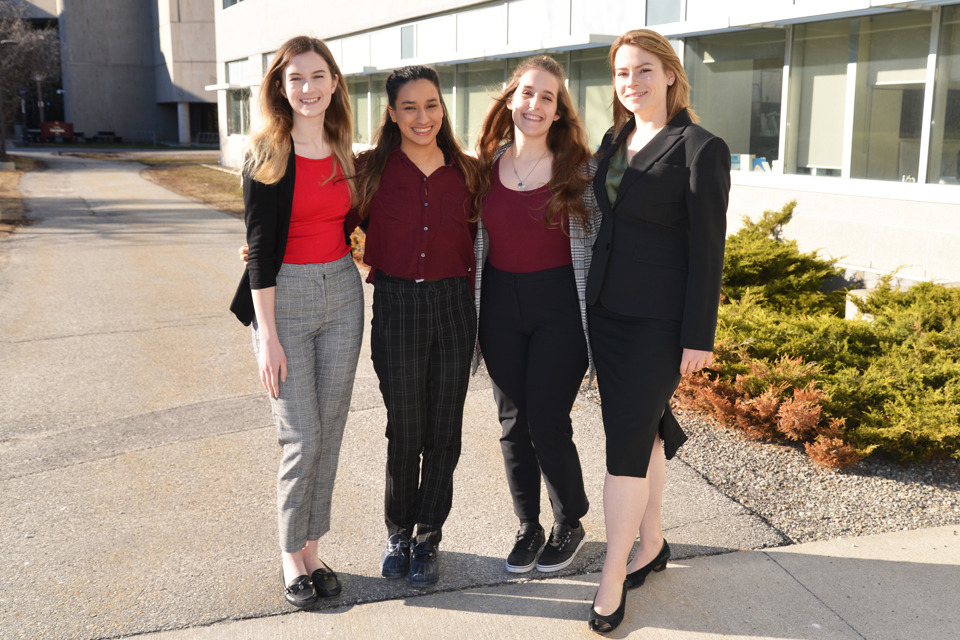Using her network of classmates and friends, uOttawa MD student Emma Grigor launched the Medical Equipment Collection (MEC) Foundation in 2016, a local non-profit that provides free medical equipment to people in financial need.
While working as a lifeguard for Easter Seals, an organization that runs camps for children with physical disabilities, Grigor first came to realize how necessary, yet financially burdening, the cost of such equipment can be.
“For our young campers, having their walkers, wheelchairs or canes meant that they could move independently and have autonomy during activities,” she explained. “After talking to their parents, I was astonished to learn the significant costs associated with purchasing a wheelchair or walker. This made me think about how such a need could impact people’s lives, especially if they face financial challenges.”
Later that same year, Grigor met a social worker while volunteering at The Ottawa Hospital Rehabilitation Centre who told her that unused medical equipment often gets thrown away at long-term care and retirement homes simply because they don’t have enough storage space.
“That conversation sparked the idea to create a community project to help get this equipment to people in need,” said Grigor. “I was nervous in the beginning since there were many unknowns and considerations that came with leading such a complex new initiative. I learned to adapt to being out of my comfort zone and sought advice from health care leaders who could share their expertise.”
One of these experts was Nathan Rusthoven, the social worker who inspired Grigor’s project. Rusthoven helped connect the Foundation with community partners including Spinal Cord Injury Ontario, Carefor, The Ottawa Mission and the MS Society of Canada.
These partners contact the Foundation with requests from people in need of equipment, while maintaining their privacy and confidentiality. At the same time, the Foundation also works with a list of long-term care and retirement homes that donate their unused equipment toward helping those who may not be able to afford it.
Since 2016, the MEC Foundation has grown from a team of a few friends to over 25 students from uOttawa and Carleton University, including a group of executive members who lead various aspects of the project from equipment collecting, storing, categorization and matching to the people who fit the precise type of equipment.
“To see first-hand the impact that this project has on people in the community is extremely touching,” said Kaitlyn Rourke, a fourth-year uOttawa Biomedical Sciences student, who is currently the executive director at the Foundation. “It also taught me to be more aware of the accessibility issues in our society.”
Another student volunteer, Clara Faltas, who is a uOttawa nursing student, said that being part this project has given her more insight into the equipment used in hospitals and enhanced her knowledge of patient care on the front lines where she has seen a lot of patients who need walkers—and some can cost up to $500.
“People have a misconception that health care in Canada is completely free, but that’s not the case, especially if they don’t have insurance,” added Jenna MacNeil, uOttawa MD student and vice-president of the Foundation. “These types of equipment are often only partially covered, or not at all.”
To date, the Foundation has distributed over 80 pieces of medical equipment and received a tremendous amount of positive feedback from people in the community, including a touching testimonial from one equipment recipient who said: “Before, I had a lot of difficulty going to see my family physician. Now I can go with my scooter without a problem and without delay. I can go to the pharmacy, the laboratory and the grocery store, and manage on my own. Also, financially, I am saving a lot of money on transportation for trips. I feel psychologically better; I am happier than before.”
“Although we are a fairly new community initiative, we have come a long way,” said Grigor. “Many of our volunteers are going through medical training and an important goal we share is to advocate for vulnerable people. I’m optimistic that innovative solutions like ours, recycling unused equipment for people in need, is a way to improve quality of care for vulnerable groups without placing an added burden on health care resources.”
As for next steps, Grigor and her teammates are currently raising funds to cover the legal cost of obtaining official charity status for the MEC Foundation. They’re also looking for more storage space to keep up with equipment inventory.
For more information about the group and how to donate equipment or funds, please visit the official website.

